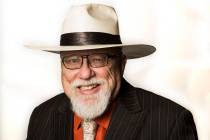Doctor’s efforts to raise alarm about Desai rebuffed
Well before Dr. Dipak Desai faced criminal charges, Dr. Charles Cohan gave you the sense that the best the physician at the center of the 2007 hepatitis C outbreak in Las Vegas should hope for professionally is popping prisoners’ hemorrhoids, if he was allowed to practice medicine at all.
Yes, the disdain he held for the gastroenterologist whom former Gov. Bob Miller appointed and reappointed to the Nevada State Board of Medical Examiners, was palpable.
Cohan’s disgust with Desai, long a financial contributor to politicians on both sides of the aisle, began shortly after Cohan started practicing here in 1994, when a string of patients unhappy with Desai’s care came to him for help.
The more Cohan heard, the more concerned he became about the welfare of patients who saw Desai, whose bragging to other doctors about doing colonoscopies in less than five minutes –– a typical procedure takes 20 minutes to an hour –– worried Cohan.
“Many were appalled by Desai’s work,” said Cohan, whose deposition testimony from the East Coast may be key in a District Court lawsuit now under way against Health Plan of Nevada, in which two women who contracted hepatitis at Desai’s clinic allege that HPN disregarded evidence about Desai, allowing him to win a contract to do HPN procedures, saving the company millions.
What made Cohan different from most practitioners –– former Desai technician Judy Witman says in 1989 she also made an unanswered complaint to the board about Desai not giving staff time to clean colonoscopy scopes –– is that he went to authorities.
He gathered evidence about: fraudulent charges for hourlong exams that took five minutes; a failure to detect cancerous tumors or ulcers; an altered record to cover up diagnosis failure; ads falsely reporting Desai’s staff was board certified in gastroenterology.
Evidence given to the medical board was quickly screened and dismissed –– with the help of Desai, who had become head of the board’s investigative committee.
“The corruption was so blatant,” Cohan said in a call from his Pennsylvania home, noting the minor advertising charge was “so black and white” the board “had to fine” Desai $2,500.
Though aware other government agencies and law enforcement are reluctant to investigate the work of physicians because they expect the medical board, with its supposed expertise, to take the lead in policing its own, the frustrated Cohan still took 400 pages of evidence to the state attorney general’s office. He said it was dismissed without investigation of listed contacts. The name of Desai’s attorney on the 1999 dismissal letter from the attorney general’s office was Bob Miller, who had recently left the governor’s office. Cohan said he believes Miller, who said he once had a polyp removed by a caring Desai, stopped a probe of Desai.
But Miller told me in 2008 he “absolutely” denies interceding on Desai’s behalf.
Former Attorney General Frankie Sue Del Papa said Miller never pressured her to end a probe of Desai. She said her office did not find merit in Cohan’s complaints.
Attempts to reach Miller for further comment on Desai were unsuccessful.
A strategy HPN attorneys are taking in trying to discredit Cohan, who met with the insurer’s administrators in the late ’90s to share information on Desai, makes tactical sense. They’ve created a diagram for the jury showing agencies such as the medical board and state attorney general that didn’t act on his claims of unsafe practices by Desai, hoping a jury then assumes there is no merit to the claims.
Cohan said that because he did colonoscopies for the insurer it could also be argued that the reason he warned its administrators about Desai is that he didn’t want to lose money.
“But I didn’t want people hurt –– the bid Desai put in was so low he’d have to do procedures in just minutes to make money,” Cohan said, adding he and his wife were so disgusted by what they perceived as local corruption that they bought land in Pennsylvania and planned to move.
That happened earlier than anticipated in 1999 after Cohan said an unidentified man phoned, warning that if he didn’t stop agitating against Desai, his family was in jeopardy. “My wife was scared to death,” said Cohan, who can’t prove who was behind the call.
“More than anything, looking back on it, I really feel sorry for the people in the state of Nevada,” Cohan said. “If state agencies had worked as they should have, the biggest public health crisis in the history of the United States needn’t have happened.”
As he worked to get other physicians to come forward during the early police investigation of Desai, Clark County prosecutor Scott Mitchell made no secret of his admiration for Cohan, who’s a critical witness in Desai’s criminal trial scheduled this spring:
“I wish other doctors in our community would come forward the way he did, and has.”
Contact reporter Paul Harasim at pharasim@
reviewjournal.com or 702-387-2908.

















